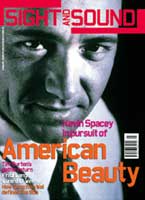Primary navigation

UK/Canada 1998
Reviewed by Geoffrey Macnab
Our synopses give away the plot in full, including surprise twists.
A seaside town in Southern France. Nimi, a single mother raising her young son Sammy, is under pressure from family and friends to find a husband otherwise she will be ostracised by her Nigerian community. The handsome new Reverend Fola, who is clearly attracted to Nimi, seems an ideal candidate. Sammy, however, has struck up a friendship with middle-aged, wealthy white ex-pat Brit Matthew, the author of the Saracen comic books Sammy so admires.
Thanks to Sammy's plotting, Matthew meets Nimi. He hires her to redesign his sprawling garden. Eventually she begins an affair with him. Her mother and friends disapprove. Matthew's wife turns up on a brief visit. She warns Nimi they have an open marriage; Nimi is liable to be hurt if she carries on seeing Matthew. Disconsolate, Nimi breaks off the affair and prepares to marry Fola. Matthew saves Sammy from drowning, but even his heroics don't seem to sway her. Matthew turns up just as Nimi is about to be married and asks her to reconsider. Finally convinced that he is sincere, she breaks off with Fola and commits to Matthew instead.
Like Bertolucci's recent film Besieged, The Secret Laughter of Women is about the relationship between a young African woman, in this case Nimi, a single mother with a mischievous eight-year-old son, and an aloof but charming ex-pat Englishman Matthew. Where Bertolucci's film was set in a grey, autumnal Rome and was full of jarring handheld camerawork, Peter Schwabach's debut feature unfolds in a French coastal town at the height of summer. The blue skies and the flamboyant costumes worn by the Nigerian women who swarm around Nimi, advising her about whom she should marry and how she should behave, help to create a mood of benevolence. With its travel-show locations and such warm, luxuriant colours to the fore, we know right away no one is going to suffer.
O. O. Sagay's perceptive, often witty screenplay shows the burden that family, church and community place on the free-spirited single mum. "This society is like a blanket against the cold world outside," one character tells Nimi, but the downside, as Matthew warns her, is that if she does do exactly what this society demands, she risks "burying her life under an avalanche of duty and obligation." For an outsider like Matthew, the close-knit Nigerian community seems more hostile than welcoming. He doesn't understand its codes, its tradition of hospitality or the meaning of the mysterious proverbs the women quote. But this is a romantic comedy, not a searching drama about exile or cultural and racial difference. It's obvious Nimi and Matthew are going to get together in the end, however fraught their courtship. The Reverend Fola, Matthew's rival, may be good-looking and command respect from Nimi's interfering, if kind-hearted, mother, but the moment Nimi's son Sammy spills food on him in church, we realise that he is far too priggish and too censorious for Nimi.
Sammy is the go-between who introduces his mother to Matthew, but as a character in his own right, he threatens to unbalance the film. What otherwise seems like an adult romance turns into a kids' movie whenever he's around. There are some bizarre shifts in tone. One moment, Sammy and Matthew are chatting about comic-book heroes and plotting mischief; the next, Matthew's snobbish, arrogant wife is demanding to know why he doesn't want to go to bed with her. Still, even if the clunky, boy's-own action sequences (such as Sammy's near drowning) don't sit at all comfortably with the scenes delving into the characters' troubled love lives, and even if some of the romantic scenes verge on the cornball The Secret Laughter of Women is warm, easygoing and picturesque - a film very hard to dislike.